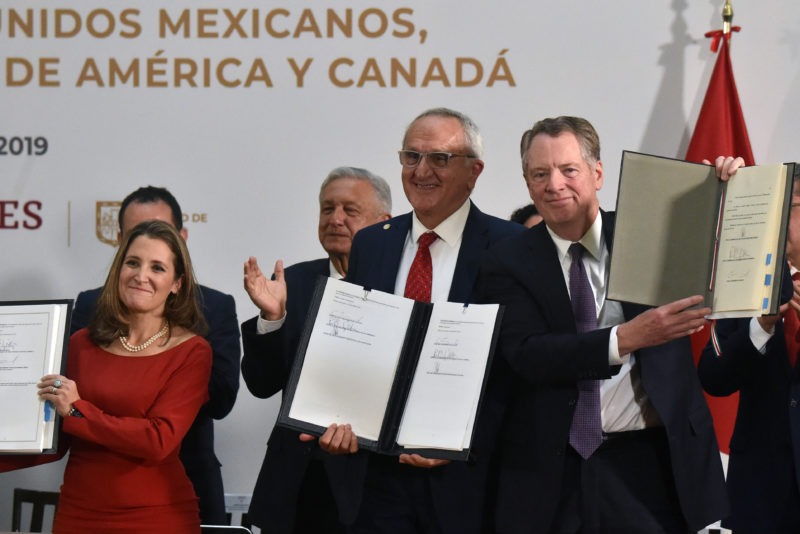Mexico ratifies modified N. American trade deal
Canadian Vice-Prime Minister Chrystia Freeland (L), United States Trade Representative Robert Lighthizer (R) and Mexican negociatior Jesus Seade (C) show documents after signing in Mexico City on December 10, 2019 (RODRIGO ARANGUA )
<p>Mexico City (AFP) – The Mexican Senate ratified the modified North American free trade agreement with the United States and Canada on Thursday after more than two years of arduous negotiations.</p><p>New additions introduced Tuesday to the United States-Mexico-Canada Agreement (USMCA) — which notably toughen the deal’s labor enforcement provisions — were rubber stamped by 107 votes to one, making Mexico the first country to sign on.</p><p>"We’re already done it in Mexico: the president has signed it and the Senate has ratified the USMCA," Mexican President Andres Manuel Lopez Obrador tweeted. "Now it is up to the US and Canadian legislatures to do the same. It’s good news."</p><p>The path to ratification for the other two countries, expected in early 2020, also looks clear for USMCA.</p><p>It replaces the 25-year-old North American Free Trade Agreement (NAFTA), which President Donald Trump complains has been "a disaster" for the US.</p><p>First signed in November 2018, USMCA got bogged down in political complications, particularly in the United States, where opposition Democrats questioned whether it would really force Mexico to deliver on labor reforms meant to level the playing field between Mexican and American workers.</p><p>But another year of talks produced a series of additions — notably including tougher enforcement of labor provisions — that won the blessing of House Speaker Nancy Pelosi, the key Democrat needed to move the agreement forward, as well as the largest US labor federation, the AFL-CIO.</p><p>The deal was signed by US Trade Representative Robert Lighthizer, Canadian Deputy Prime Minister Chrystia Freeland and Mexican Undersecretary for North America Jesus Seade during a ceremony in Mexico Tuesday. </p><p></p><p>- ‘Historic act’ -</p><p>During Thursday’s debate in Mexico’s Senate, lawmakers said the new trade accord will stimulate the Mexican economy — which is forecast to contract this year — and instill confidence in investors.</p><p>The deal is a "historic act" for Mexico, Senator Ricardo Monreal of the Senate majority Moreno party said, for its potential to create jobs.</p><p>Some opposition senators, while voting in favor of the accord, said there should have been more time for debate on it while others said free trade had made economic inequality more acute.</p><p>Gustavo Madero of the conservative opposition National Action Party (PAN) welcomed the new agreement, saying its ratification "will send a signal of confidence (to Mexico) in a delicate moment."</p><p>But he complained of having to take the vote "in a hurry" thanks to the "political times," a reference to the quickly approaching 2020 presidential election in the US. </p><p>The only Mexican legislative vote against the USMCA Thursday came from independent Senator Emilio Alvarez Icaza, who described the deal as a giant "contradiction" to Lopez Obrador’s mandate and represented a "neoliberal triumph" — an ideology the leftist president promised to leave behind when he took office a year ago. </p><p>"Such haste to agree, to ratify it, even though neither the United States nor Canada has approved it," Alvarez said. </p><p></p><p>- NAFTA replacement -</p><p>NAFTA, the historic 1994 pact that erased nearly all tariffs across the region, deeply integrated its economies and helped turn Mexico into an export powerhouse.</p><p>Under that deal, the region — which represents close to 30 percent of the global economy and is home to nearly 500 million people — did $1.2 trillion in trade last year.</p><p>Analysts say USMCA is similar to NAFTA in many respects, but there is improved access for US agricultural goods, including dairy products, which Canada in particular had tried to limit.</p><p>It includes rules designed to improve US auto workers’ competitiveness, requiring 40 percent of each duty-free car to be made by people earning at least $16 an hour.</p><p>Besides labor enforcement rules, the additions signed Tuesday include tougher measures to monitor environmental provisions, and remove the requirement for the countries to provide at least 10 years of exclusivity for biologic drugs, which blocks cheaper generic versions.</p><p></p>
Disclaimer: Validity of the above story is for 7 Days from original date of publishing. Source: AFP.


